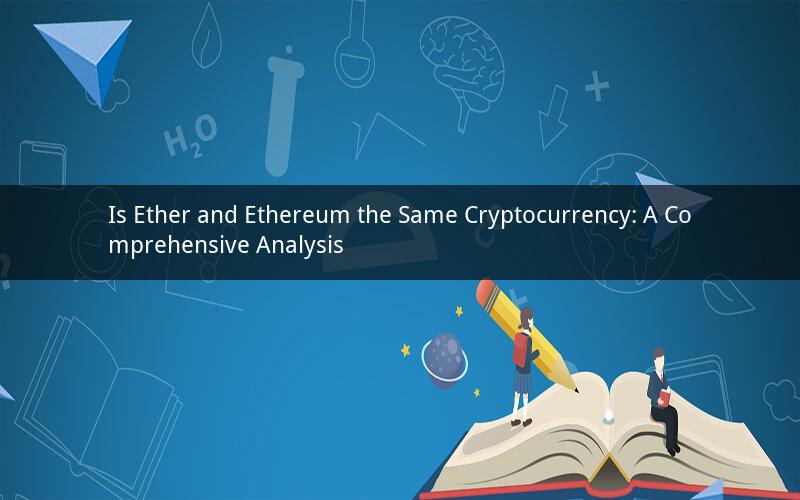
Introduction:
The cryptocurrency world is vast and ever-evolving, with numerous digital currencies emerging each day. One of the most frequently asked questions in this domain is whether Ether and Ethereum are the same cryptocurrency. In this article, we will delve into the details and provide a comprehensive analysis to shed light on this topic.
Section 1: Understanding Ethereum
Ethereum is a decentralized blockchain platform that enables developers to create and deploy smart contracts and decentralized applications (DApps). It was proposed by Vitalik Buterin in 2013 and launched in 2015. Ethereum operates on a proof-of-stake consensus mechanism and has a native cryptocurrency called Ether (ETH).
Section 2: What is Ether?
Ether is the native cryptocurrency of the Ethereum network. It serves as the medium of exchange within the Ethereum ecosystem. Ether can be used to pay for transaction fees, deploy smart contracts, and participate in staking to earn rewards. It is important to note that Ether is distinct from Ethereum, as it is the digital token that powers the Ethereum platform.
Section 3: Are Ether and Ethereum the Same Cryptocurrency?
Contrary to popular belief, Ether and Ethereum are not the same cryptocurrency. They are two distinct entities that are closely related but serve different purposes. Here's a breakdown:
1. Ethereum is a blockchain platform that facilitates the creation and execution of smart contracts and DApps.
2. Ether is the native cryptocurrency that powers the Ethereum network, enabling transactions, smart contract deployment, and staking.
While Ether is integral to the functioning of the Ethereum platform, they are not interchangeable. You cannot use Ether outside the Ethereum network, and Ethereum cannot exist without Ether.
Section 4: The Relationship Between Ether and Ethereum
Despite their distinct nature, Ether and Ethereum are closely interconnected. Here's how they are related:
1. Ether is used as the fuel for the Ethereum network, facilitating transactions and smart contract execution.
2. The Ethereum platform requires Ether to power its operations, including transaction fees and staking rewards.
3. Ethereum's success and adoption contribute to the demand for Ether, driving its value.
Section 5: The Importance of Distinguishing Between Ether and Ethereum
It is crucial to understand the difference between Ether and Ethereum, as it can have significant implications for investors and users:
1. Misconceptions about Ether and Ethereum can lead to poor investment decisions and financial losses.
2. Recognizing the distinct nature of Ether and Ethereum can help users make informed decisions about their cryptocurrency holdings.
3. Understanding the relationship between Ether and Ethereum can provide a clearer picture of the cryptocurrency market's dynamics.
Section 6: Frequently Asked Questions
Question 1: Can I use Ether on other blockchains?
Answer: No, Ether is specifically designed for the Ethereum network and cannot be used on other blockchains.
Question 2: What is the purpose of Ether?
Answer: Ether serves as the fuel for the Ethereum network, enabling transactions, smart contract deployment, and staking.
Question 3: Can I mine Ether?
Answer: No, Ether is not mineable like Bitcoin. It is generated through a process called staking, where users lock their Ether in a smart contract to validate transactions and earn rewards.
Question 4: Can I use Ethereum without Ether?
Answer: No, Ethereum requires Ether to power its operations. Without Ether, you cannot execute transactions or deploy smart contracts on the Ethereum network.
Question 5: How does the Ethereum network ensure security?
Answer: The Ethereum network ensures security through its proof-of-stake consensus mechanism, where validators lock their Ether in a smart contract to participate in transaction validation and earn rewards.
Conclusion:
In conclusion, Ether and Ethereum are not the same cryptocurrency, although they are closely related. Ethereum is the blockchain platform that enables the creation and execution of smart contracts and DApps, while Ether is the native cryptocurrency used to power the Ethereum network. Understanding the distinction between the two is crucial for investors and users to make informed decisions and navigate the cryptocurrency landscape effectively.